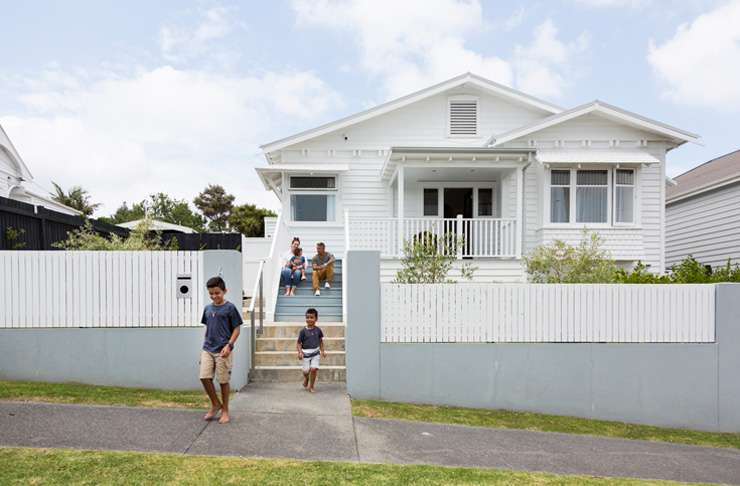You’ve fallen in love with a property and want to buy it. You’ll need to have your ducks lined up. That includes your mortgage, your KiwiSaver withdrawal, a property inspector to write a pre-purchase report, and a lawyer (or conveyancer) to handle the sale for you.
Try not to become too attached. If you're bidding at auction, you may not win. Property sales fall through for other reasons as well, such as the vendor asking too much, or hidden issues that the property inspector or lawyer discovers.
Buying at auction
Bidding at auction is one of the most common ways to buy property in New Zealand. At auction you bid against others to buy the home. The auction is run by an auctioneer who opens the bidding at a figure that is usually less than the reserve, the price the seller is willing to accept. Each bid needs to be higher than the previous bid.
Start your property search
When buying at auction you are usually buying unconditionally, so you cannot back out. Sometimes the seller will agree to a variation of agreement in advance, such as a lower deposit amount, or the settlement date.
If the auction doesn’t reach its reserve, it will very often sell shortly after, by negotiation with the highest bidder. Sometimes conditional buyers who need time to get finance will be considered if the auction fails to result in a sale.
If you win at auction, you will need to pay the deposit, usually 10%, on the same day. You will also have to sign the sale and purchase agreement.
Other methods of sale include:
• Sold by negotiation: When a house is sold by negotiation, buyers make offers which sellers can accept or negotiate on (called countersign or counter offer).
• Sold at tender or ‘by deadline’: Some properties are sold at tender or by deadline sales (also called “treaties”). With a tender you make written offers by a certain date, which are considered by the seller. A deadline sale is similar with buyers able to make an offer any time up to the deadline.
For tenders and deadline sales you usually only get one shot at making an offer, so need to make it your best first time. The seller chooses between the offers presented.
How to make an offer on a house
If the house is for sale by negotiation, you offer an amount you are prepared to pay. Usually you don’t make your best offer immediately.
Offers are made to the vendor via the real estate agent who is selling the property. The offer is made on a sale and purchase agreement document, noting any conditions, such as subject to finance, building reports, LIM (land information memorandum), or due diligence (investigation). The seller can either accept your offer, or make a counter offer.
Buyer and seller continue to negotiate in this way until an agreement is reached. If you are in a multi-offer situation where there are other potential buyers you might need to put your best offer on the table early.
Before making your starting offer, it’s a very good idea to get your lawyer to check the contract and property records of title (showing ownership and other information). Your lawyer will also check the title for any defects.

You will need to complete paperwork to complete your purchase. Always ensure your documents are reviewed by a lawyer before you sign. Photo / Getty Images
Most existing homes in New Zealand are sold using the standard ADLS/REINZ Sale Purchase of Real Estate Agreement. Even then, there can be different clauses used.
Sale and purchase agreements for new-builds are often bespoke and could have worrying clauses that a lawyer will spot.
Types of offers you can make
Your offer can be unconditional, or conditional. Some of the common conditions include:
• Securing finance
• Getting a satisfactory building report
• A longer than normal settlement period
• A sunset clause which voids the agreement after a certain period of time
• Early access to do renovations prior to settlement.
Sellers tend to prefer unconditional offers or at least as few conditions as possible. As a result, your offer is more likely to be accepted if it has fewer conditions.
What happens after you make an offer?
An offer by negotiation or tender is not legally binding until it is accepted and both the buyer and seller sign the sale and purchase agreement (contract).
Buyers should not make offers on multiple properties at the same time, because they are duty-bound to buy both properties if the offers are accepted.

Once you've gone unconditional and the property settled you are ready to start your new life in your new home. Photo / Getty images
Once both buyer and seller have signed, the contract is “unconditional”. This means you can’t back out even if you change your mind. Buyers will need to pay the deposit as soon as the contract is signed.
Legal fees and paperwork
Buying a home is a big commitment and there is quite a bit that could go wrong. A lawyer works for you and checks the sale and purchase agreement, the title, the LIM, and does the transfer of the property on settlement day. It’s best to choose a specialist property lawyer to do this work.
The cost of conveyancing is typically $1000 to $1500. Some lawyers offer a cheaper service, but may charge extra for ‘disbursements’ such as Land Information New Zealand (LINZ) fees and other expenses.
What happens at settlement?
A few days prior to the home becoming yours, you will to do a pre-settlement inspection to ensure the house is in the condition it was when you agreed to buy.
Settlement day is when the property transfers to you and it’s officially yours. It can be a long nerve-wracking day in which a lot happens behind the scenes.
The buyer’s lawyer needs to arrange for payment to be transferred to the seller’s lawyer and in return the title transfer is completed and the keys released. That sounds straightforward, but takes time because of the number of steps needed. If one side is not ready to settle, they can be charged penalties.
The vast majority of purchases go through without problem, but sometimes things can go wrong, such as the seller or tenants failing to move out, rubbish left behind, new damage to the property, or missing keys. In circumstances such as these the lawyers will negotiate to reach a satisfactory resolution before the settlement goes through.
Once settlement is complete you pick up the keys and can move in. Sometimes it pays to book removal vans for the day after settlement, just in case things go wrong on settlement day and you waste your money.
------
The OneRoof first home buyer's guide
- Part 1: How to set a budget for your first home
- Part 2: How to save for a house deposit
- Part 3: How to get a home loan
- Part 4: What grants do first home buyers get?
- Part 5: How to find the right property
- Part 6: How the house buying process works














































































